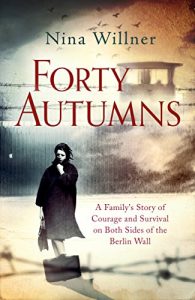In Forty Autumns, Nina Willner recounts the history of three generations of her family - mothers, sisters, daughters and cousins - separated by forty years of Soviet rule, and reunited after the fall of the Berlin Wall.
Shortly after the end of the Second World War, as the Soviets took control of the eastern part of Germany, Hanna, a schoolteacher's daughter, escaped with nothing more than a small suitcase and the clothes on her back. As Hanna built a new life in the West, her relatives (her mother, father and eight siblings) remained in the East. The construction of the Berlin Wall severed all hope of any future reunion.
Hanna fell in love and moved to America. She made many attempts to establish contact with her family, but most were unsuccessful. Her father was under close observation; her mother, younger sister Heidi and the others struggled to adjust to life under a bizarre and brutal regime that kept its citizens cut off from the outside world.
A few years later, Hanna had a daughter - Nina - who grew up to become the first female US Army intelligence officer to lead sensitive intelligence collection operations in East Berlin at the height of the Cold War. At the same time, Heidi's daughter, Cordula, was training to become a member of the East German Olympic cycling team. Though separated by only a few miles, Nina and her relatives led entirely different lives.
Once the Berlin Wall came down, and the families were reunited, Nina Willner discovered an extraordinary story. In Forty Autumns she vividly brings to life many accounts of courage and survival, set against the backdrop of four decades that divided a nation and the world.






